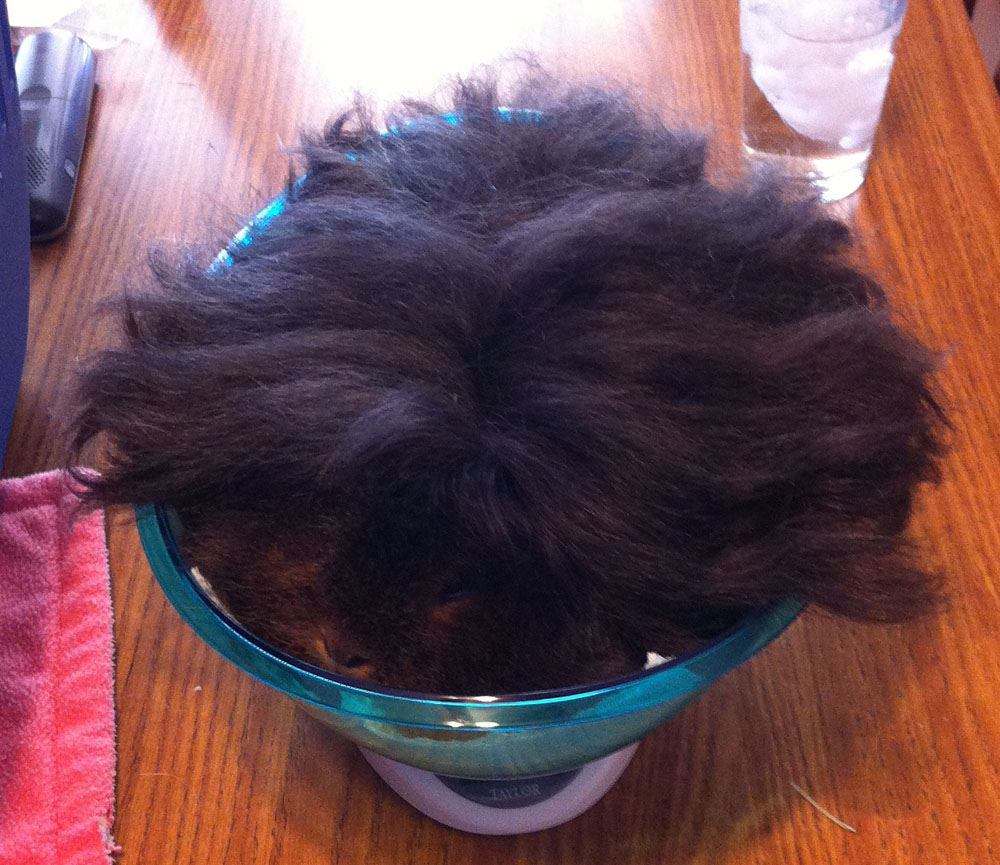We do not diagnosis and do not recommend diagnosing your guinea pigs. If your guinea pigs have symptoms suggestive of illness (e.g., running nose, wheezing, bloated / hard belly, lethargy etc.), have lost weight, have begun to refuse foods normally eaten, and/or are not behaving normally, take them to an exotic vet with experience in treating guinea pigs right away. Your guinea pigs' life often depends on you getting veterinary care right away. See our veterinary page for exotic vets in the DC-VA-MD area.

How to weigh your guinea pigs
Weigh each of your guinea pigs weekly using a small kitchen food scale. Put a small, open box on top of the scale (large enough for your guinea pig to sit in),
tare the scale to remove the weight of the box, and then put your guinea pig in the box to weigh him/her. Record the weight in grams.
Try to weigh at the same time of day, for instance before giving your guinea pigs their breakfast veggies, to improve accuracy (after a meal, your guinea pigs may weigh more).
Why weigh your guinea pigs?
Weighing your guinea pigs helps spot illness. Sometimes the only symptom of illness may be a gradual loss of weight over a few weeks.
A weight loss of 10% or more (within one week and/or over several weeks) is when you should become concerned and take the guinea pig to the vet even if you see no other symptoms of illness.
Signs of illness?
If your guinea pigs have symptoms suggestive of illness (e.g., running nose, wheezing, bloated / hard belly, lethargy etc.), have lost weight,
have begun to refuse foods normally eaten, and/or are not behaving normally, take them to an exotic vet with experience in treating guinea pigs right away. Your guinea pigs' life
often depends on you getting veterinary care right away.
If your guinea pig is not eating, talk to your vet about providing Critical Care
or Sherwood SARx
See the video below on emergency care kit for more information.
Annual vet visit
Guinea pigs should go to the vet once a year for a well-check. It's important to take them to an exotic vet with experience treating guinea pigs.
See our veterinary page for exotic vets in the DC-VA-MD area.
Prescribed antibiotics by the vet?
If your guinea pig was prescribed antibiotics by the vet, ask your vet about probiotics. Antibiotics can destroy healthy gut bacteria, which can result in abnormally soft stools (or diarrhea).
Bene-bac Plus
Pet Gel is an easy to administer probiotic designed for pets. Most guinea pigs will immediately latch onto the tube of Bene-bac and take the dispensed dose (1 gram once per day, taken at a different time
from the prescribed antibiotics).
If do not have Bene-bac on-hand when needed or are having trouble administering Bene-bac, you also may provide human probiotics via oral syringe.
Purchase a non-dairy human probiotic supplement, with roughly 1.5 billion cells that is in capsule form. Take a small bottle and put four 1.0 ml syringes of carrot juice or water.
Then open up 1 capsule of the human probiotic, pour the probiotic contents into the liquid, and mix it in. Give one 1.0 ml syringe of the mixture 1x per day.
So, 1 capsule will last 4 days. Keep the mixture refrigerated.
Vet prescribed medication administration
Need help administering medications or Critical Care prescribed by the vet? Watch our video and see us administer medication to a guinea pig.
Bloat
Did you know that guinea pigs can die from too much gas building up in their digestive system? Guinea pigs can develop bloat for a variety of reasons, including eating foods that cause gas (e.g., broccoli),
not eating, etc. It is a medical emergency if your guinea pig appears swollen and the stomach appears distended. In some cases, there may be no sign other than lethargy and a refusal to eat.
In both cases, take your guinea pig to the vet immediately. You can consider providing Simethicone for infants (half of the infant dose) to help alleviate mild gas pressure but still should take the guinea pig
to the vet immediately. If you provide Simethicone for infants, make sure to purchase Simethicone with NO pain medication added (NO Acetaminophen and NO Ibuprofen).
Hand-feeding
If your guinea pig is not eating, talk to your vet about providing Critical Care
or Sherwood SARx
See the video below on emergency care kit for more information.
Copyright © 2011 - All Rights Reserved - Metropolitan Guinea Pig Rescue
Template by OS Templates